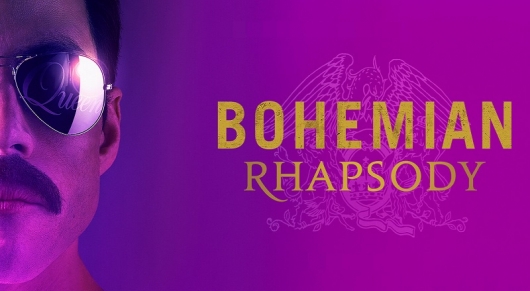
REVIEW: ‘Bohemian Rhapsody’ brings the real life of Queen’s Freddie Mercury to the silver screen

Director Bryan Singer’s film “Bohemian Rhapsody” is as inspirational as it is heartbreaking. The film focuses on the aspects of the early life and development of the band Queen, lead singer Freddie Mercury’s struggles with sexual identity, and the strains of fame on his relationships at home and in the band. What results is an emotional journey through the development of Queen and their transcendent super-star status.
Watching the band form on-screen is an absolute pleasure, as Freddie (played by Rami Malek) approaches the band after a show as a fan, only to find that they have conveniently found themselves without a lead singer. The chemistry among Freddie, Brian May (played by Gwilym Lee) and Roger Taylor (played by Ben Hardy) is palpable from the beginning, as they make lighthearted digs at one another in their first conversation.
Throughout the film, audience members grow fond of Malek’s portrayal of the “hysterical queen,” as his often egotistical and overdramatic provocations provide laugh-out-loud moments. Simultaneously, the scenes reinforce Freddie’s place as an innovator whose powerfully independent and strong-willed artistry earned him his legendary status. While the film tells a mostly positive story of Queen, it does not hesitate in presenting stories of their hardships and mistakes.
Criticisms of the band are addressed during an early scene in which Freddie leaks the song “Bohemian Rhapsody” to a radio station before its official release. As the record begins, the audience is treated to a flurry of written negative criticism from famous publications suggesting heavily that the single will fail over the famous backdrop of the band’s silhouettes singing the introduction to the song.
Scenes involving Mike Myers as Ray Foster, a record executive, are especially memorable, as the differences between the artists and the business side of the industry create obvious friction for Freddie throughout the film.
Despite the many comedic moments, the film “Bohemian Rhapsody” isn’t lacking in emotional performances from Malek, as the film highlights Freddie’s struggles with substance abuse, abusive relationships and persecution regarding his sexual orientation. Watching Freddie fall from grace on-screen is harrowing for viewers, as his lovable and unstoppable drive to perform before his separation from Queen is stripped from him by manipulative forces within his life who seek to take advantage of his fame for their personal gain.
The emotional musical finale culminates as a result of strongly written characters, well-paced storytelling and excellent cinematography which effectively capture the story in a way that supersedes cinema and turns the theater into an arena by the time the film has reached its denouement.
Ultimately, “Bohemian Rhapsody” is a deeply impactful biopic on arguably one of the greatest artists of all time, all the while acting as a moving commentary on the nature of society’s treatment towards celebrities, sexuality and privacy. Despite these struggles, Freddie Mercury overcomes them and demands that his legacy belongs entirely to him, an empowering message to the audience that your legacy lies ultimately in what you say and do during your life, not what other people say about you.

Well written piece! I look forward to watching the film and seeing if it is as balanced a portrayal of Queen as your review of the film is.